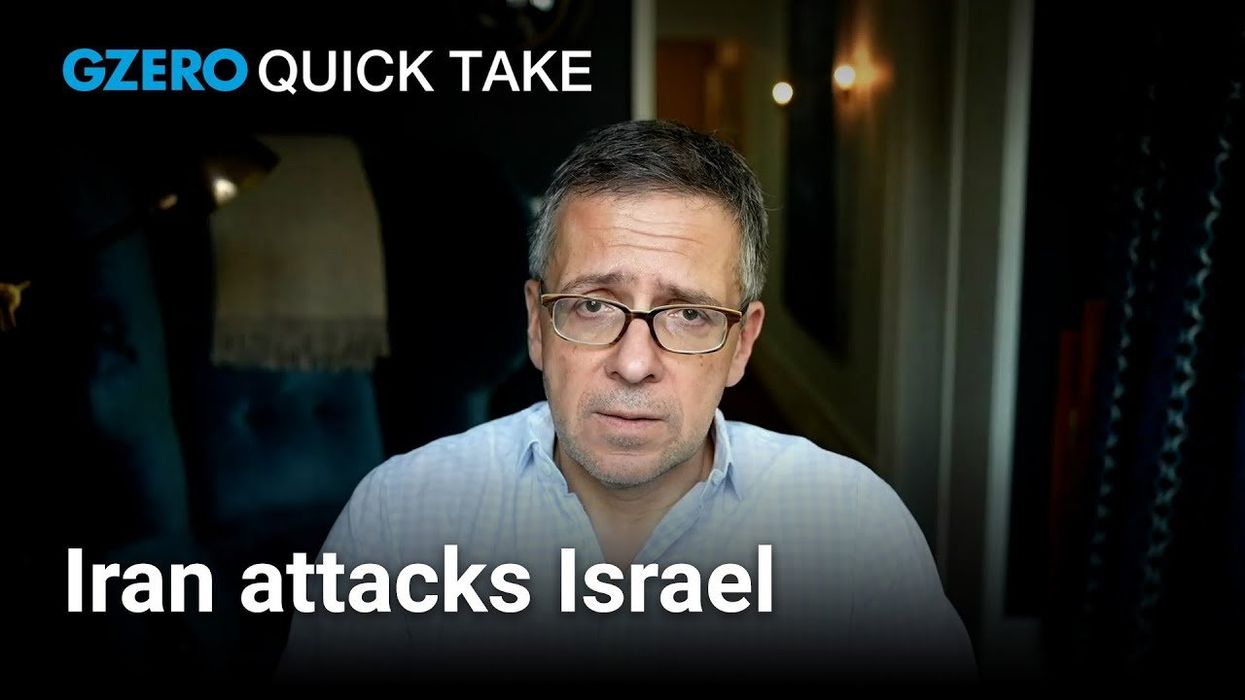VIDEOSGZERO World with Ian BremmerQuick TakePUPPET REGIMEIan ExplainsGZERO ReportsAsk IanGlobal Stage
Site Navigation
Search
Human content,
AI powered search.
Latest Stories
Start your day right!
Get latest updates and insights delivered to your inbox.
Ian Bremmer's Quick Take: Hi, everybody. Ian Bremmer here, and a Quick Take on a Sunday, which usually means something is not going well, and that is certainly the case in the Middle East, where you had unprecedented strikes by Iran and its proxies against Israel.
Now, on the one hand, clearly a very dangerous thing to do, on the other hand, could have been a hell of a lot worse. What do I mean by that? Well, it is not World War III. Americans warned Iran not to hit the United States, and the Iranians gave a heads-up, days in advance, through a number of actors, most importantly through Iraq. This reminds me very much of after the American servicemen and women, three were killed in Jordan, by an Iranian proxy. The Americans did not want a war to break out with the Iranians directly, waited about a week, gave a heads up through Iraq, of the kind of attack that the Americans were planning, waited four days, gave the Iranians a chance to basically prepare and get their own forces out, and warned them that if this were to happen again, there would be direct consequences, a direct strike on Iran itself.
In this case, you had the Iranian heads-up that gave the Americans and allies time to pre-position, to provide diplomatic support, both publicly and privately, to the Israelis. Send the head of CENTCOM to Israel, say that American support for Israel was ironclad, help ensure that the Israelis would be able to most effectively defend itself against the coming Iranian attack. That was, on the one hand, a really big deal by the Iranians that was meant to be a maximal display of force and a minimum likelihood of casualties. But still, there was a significant possibility of accident, that you could have a risk that would lead to a war directly between Iran and Israel. Something that the Americans desperately wanted to avoid because it would bring the US in. It would spike oil prices. It would probably mean the end of Biden's, potential of a second presidency. And it, of course, would also mean that Iran was going to get hit massively by the United States and Israel, something they wanted to avoid.
We saw hundreds of drones and ballistic missiles, many from proxies, but many from Iran itself, over 99% of which were taken down. And they were aimed solely at military targets in Israel. So again, lots of effort to try to reduce the risk but the potential that you would have had a number get through, accidentally hitting civilians or having significant military hit, that was a risk that the Iranians were prepared to take. So, it's a big deal, it’s a clear escalation, and it is certainly an effort by the Iranians to say, that if this is to happen again, that the likelihood that there will be a major war between Iran and Israel come what may, is very real. And the Iranians also said, and they said this before the missiles even hit their targets, or in the case of the vast majority of them were intercepted, said through the United Nations mission that this was directly in retaliation for the Israeli strike against an Iranian leader in Damascus, and that the matter, from Iran's perspective, should be considered closed.
In other words, no further attacks were coming. So, trying to in a sense, you know, reduce the likelihood of further escalation, in advance. And clearly, all of that kept the United States from responding directly. So, the US strategy here is do everything possible to show that you will get massive support for Israeli defense and national security in the event of an attack, any attack, but also to try to put maximum constraint on the Israeli government against a response directly against Iran, and that the Americans don't want to support Israel if they were to engage in offensive attacks against Iran at this point.
What are the Israelis going to do? I mean, the hope for the United States is that while Prime Minister Netanyahu wants to do more and suck the United States into a broader war against Iran, that he is going to be constrained from doing so. In part because he was so successful, they now have a major victory on their belt under his watch, being able to defend the Israeli people completely in response to an unprecedented Iranian attack. And there's also going to be a big distraction away from the war in Gaza. Doesn't mean that Israel suddenly loses its isolation or wins the PR war globally, I think that's certainly not going to happen, but, there's less pressure on the Israelis, on the prime minister, in terms of Gaza right now as a consequence of what Iran has done. And there's also less pressure for Netanyahu to be forced out domestically in the near, in the immediate future.
Further, if he were to try to go considerably farther than Benny Gantz wants to, and the war cabinet wants to, in a response against Iran, then Netanyahu risks that they would bolt from the war cabinet and that his government would then fall apart. That's certainly a proximate risk that contains what the Israelis are likely to do. I don't think they'll sit on their hands and do nothing. At the very least, I think there'll be more significant strikes against Iranian proxies in the coming days. And the Israelis will also continue to engage in strikes against Iranian targets as they see them, as is opportune, in proxy states going forward. This is the problem, of course, is that, even though you have averted major escalation in a very dangerous period over the weekend, the Israelis and the Iranians haven't accomplished anything to stabilize their relationship longer-term.
Israel has shown that they are capable of taking out Iranian leaders in Syria, and Iran can't defend them. Iran has no intention of suddenly leaving those proxies to fend for themselves. And further, the likelihood that Israel now gets a breakthrough agreement on hostage release by Hamas, and that leads to a ceasefire, has gone down, at least in the near-term. The other side of that is the likelihood that the Israelis proceed with at least some form of ground attack into Rafah, which the Americans have warned them not to, also has gone up.
So the Hamas war with Israel is nowhere close to ending, the likelihood of continued Palestinian civilian casualties continues to grow, and the potential for further military engagement, both vis-a-vis proxies, including the Houthis in the Red Sea, the fact that the Iranians have also boarded an Israeli linked vessel in the Red Sea and that there is no effective deterrent in place right now between Israel and Iran, despite all sorts of other actors not wanting this to expand into a broader war, that all makes the Middle East right now, more dangerous.
So, I mean, none of us know, what the next shoe is going to be to drop. But if you are looking ahead over the next, let's say, six months, a couple things I think you can say. First, it is more likely that the present Israeli government is going to be in place for longer, and that the war in Gaza is going to continue without a serious effort at stabilization, or at least not one that's consequential.
That's problematic for Biden as you look ahead to the election in November. The potential that this war expands and eventually does drag in the United States and Iran more directly, is also going up. It's not imminent but it is certainly reasonably plausible, and the guardrails on that war are becoming, they are eroding as both sides are taking shots against each other.
So, a dangerous environment. A second war that is not going the way the Americans or anyone else in the world would like it to. And that's how we're kicking off our week.
That's it for me and I'll talk to you all real soon.
Keep reading...Show less
More from Quick Take
Zelensky, Trump, and NATO: A united front on Ukraine?
August 18, 2025
Trump and Putin to meet in Alaska to discuss Ukraine
August 11, 2025
US government rescinds West Point role for former cyber director
August 04, 2025
US-EU trade deal marks a win for Trump
July 28, 2025
The US, China, and the critical minerals question
July 21, 2025
Epstein conspiracies divide Trump's MAGA base
July 14, 2025
US-Brazil relations in crisis
July 10, 2025
Elon Musk vows to start a new political party
July 07, 2025
What Zohran Mamdani’s win really signals for US politics
June 30, 2025
Iran's retaliation shows strategic weakness
June 23, 2025
US enters war with Iran: What comes next?
June 22, 2025
Iran looks to negotiate ceasefire
June 16, 2025
Elon vs. Trump: Billionaire fallout goes public
June 06, 2025
Elon Musk steps down from Trump administration
May 29, 2025
Trump's weekend of geopolitical success
May 12, 2025
Can Trump and Carney reset US-Canada relations?
May 07, 2025
Trump’s ‘less is more’ message is un-American
May 05, 2025
Ian Bremmer on Trump's first 100 days
April 28, 2025
Trump’s America: A kleptocracy but not a police state
April 23, 2025
Inside the Harvard-Trump showdown
April 21, 2025
Can the US win by undoing globalization?
April 14, 2025
Who benefits from Trump's tariff wall?
April 07, 2025
Trump's tariffs & the end of globalization
April 03, 2025
Leaked Signal chat shows Trump team's mindset
March 26, 2025
What Trump team's war plans leak revealed
March 25, 2025
Is Europe in trouble as the US pulls away?
March 24, 2025
Putin-Trump Ukraine call is a small win for both sides
March 18, 2025
What will Trump offer Putin in Ukraine ceasefire talks?
March 17, 2025
Ukraine ceasefire deal now awaits Putin's response
March 11, 2025
Can Europe broker a Ukraine ceasefire?
March 03, 2025
What Trump-Zelensky fallout means for Ukraine war
March 01, 2025
Why the US-Ukraine minerals deal changed
February 26, 2025
Germany's close election limits its ability to lead Europe
February 24, 2025
Ukraine hopes for Europe's help as US negotiates with Russia
February 18, 2025
JD Vance stuns Munich conference with critique on European democracy
February 14, 2025
Trump-Putin chat over Ukraine "deeply" worries Europe
February 13, 2025
What is Trump's Gaza playbook?
February 10, 2025
Why cutting USAID will hurt American foreign policy
February 05, 2025
Why is Trump starting a trade war with Canada?
February 02, 2025
How Trump's assertive foreign policy impacts international relations
January 27, 2025
Trump's Davos address sets up big shifts in US strategy
January 24, 2025
From Davos: How global leaders are grappling with Trump’s return
January 20, 2025
Ian Bremmer on the forces behind the geopolitical recession
January 17, 2025
What Greenlanders might want from a deal with Trump
January 13, 2025
New Year's Day terror attacks highlight America's divisions
January 03, 2025
GZERO Series
GZERO Daily: our free newsletter about global politics
Keep up with what’s going on around the world - and why it matters.





























































